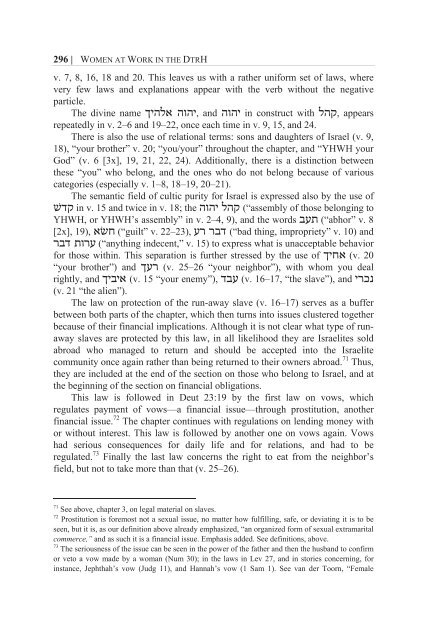Women at Work in the Deuteronomistic History - International Voices ...
Women at Work in the Deuteronomistic History - International Voices ...
Women at Work in the Deuteronomistic History - International Voices ...
Create successful ePaper yourself
Turn your PDF publications into a flip-book with our unique Google optimized e-Paper software.
296 | WOMEN AT WORK IN THE DTRH<br />
v. 7, 8, 16, 18 and 20. This leaves us with a r<strong>at</strong>her uniform set of laws, where<br />
very few laws and explan<strong>at</strong>ions appear with <strong>the</strong> verb without <strong>the</strong> neg<strong>at</strong>ive<br />
particle.<br />
The div<strong>in</strong>e name ךיהלא הוהי, and הוהי <strong>in</strong> construct with להק, appears<br />
repe<strong>at</strong>edly <strong>in</strong> v. 2–6 and 19–22, once each time <strong>in</strong> v. 9, 15, and 24.<br />
There is also <strong>the</strong> use of rel<strong>at</strong>ional terms: sons and daughters of Israel (v. 9,<br />
18), “your bro<strong>the</strong>r” v. 20; “you/your” throughout <strong>the</strong> chapter, and “YHWH your<br />
God” (v. 6 [3x], 19, 21, 22, 24). Additionally, <strong>the</strong>re is a dist<strong>in</strong>ction between<br />
<strong>the</strong>se “you” who belong, and <strong>the</strong> ones who do not belong because of various<br />
c<strong>at</strong>egories (especially v. 1–8, 18–19, 20–21).<br />
The semantic field of cultic purity for Israel is expressed also by <strong>the</strong> use of<br />
שׁדק <strong>in</strong> v. 15 and twice <strong>in</strong> v. 18; <strong>the</strong> הוהי להק (“assembly of those belong<strong>in</strong>g to<br />
YHWH, or YHWH’s assembly” <strong>in</strong> v. 2–4, 9), and <strong>the</strong> words בעת (“abhor” v. 8<br />
[2x], 19), אשׂח (“guilt” v. 22–23), ער רבד (“bad th<strong>in</strong>g, impropriety” v. 10) and<br />
רבד תורע (“anyth<strong>in</strong>g <strong>in</strong>decent,” v. 15) to express wh<strong>at</strong> is unacceptable behavior<br />
for those with<strong>in</strong>. This separ<strong>at</strong>ion is fur<strong>the</strong>r stressed by <strong>the</strong> use of ךיחא (v. 20<br />
“your bro<strong>the</strong>r”) and ךער (v. 25–26 “your neighbor”), with whom you deal<br />
rightly, and ךיביא (v. 15 “your enemy”), דבע (v. 16–17, “<strong>the</strong> slave”), and ירכנ<br />
(v. 21 “<strong>the</strong> alien”).<br />
The law on protection of <strong>the</strong> run-away slave (v. 16–17) serves as a buffer<br />
between both parts of <strong>the</strong> chapter, which <strong>the</strong>n turns <strong>in</strong>to issues clustered toge<strong>the</strong>r<br />
because of <strong>the</strong>ir f<strong>in</strong>ancial implic<strong>at</strong>ions. Although it is not clear wh<strong>at</strong> type of runaway<br />
slaves are protected by this law, <strong>in</strong> all likelihood <strong>the</strong>y are Israelites sold<br />
abroad who managed to return and should be accepted <strong>in</strong>to <strong>the</strong> Israelite<br />
community once aga<strong>in</strong> r<strong>at</strong>her than be<strong>in</strong>g returned to <strong>the</strong>ir owners abroad. 71 Thus,<br />
<strong>the</strong>y are <strong>in</strong>cluded <strong>at</strong> <strong>the</strong> end of <strong>the</strong> section on those who belong to Israel, and <strong>at</strong><br />
<strong>the</strong> beg<strong>in</strong>n<strong>in</strong>g of <strong>the</strong> section on f<strong>in</strong>ancial oblig<strong>at</strong>ions.<br />
This law is followed <strong>in</strong> Deut 23:19 by <strong>the</strong> first law on vows, which<br />
regul<strong>at</strong>es payment of vows—a f<strong>in</strong>ancial issue—through prostitution, ano<strong>the</strong>r<br />
f<strong>in</strong>ancial issue. 72 The chapter cont<strong>in</strong>ues with regul<strong>at</strong>ions on lend<strong>in</strong>g money with<br />
or without <strong>in</strong>terest. This law is followed by ano<strong>the</strong>r one on vows aga<strong>in</strong>. Vows<br />
had serious consequences for daily life and for rel<strong>at</strong>ions, and had to be<br />
regul<strong>at</strong>ed. 73 F<strong>in</strong>ally <strong>the</strong> last law concerns <strong>the</strong> right to e<strong>at</strong> from <strong>the</strong> neighbor’s<br />
field, but not to take more than th<strong>at</strong> (v. 25–26).<br />
71 See above, chapter 3, on legal m<strong>at</strong>erial on slaves.<br />
72 Prostitution is foremost not a sexual issue, no m<strong>at</strong>ter how fulfill<strong>in</strong>g, safe, or devi<strong>at</strong><strong>in</strong>g it is to be<br />
seen, but it is, as our def<strong>in</strong>ition above already emphasized, “an organized form of sexual extramarital<br />
commerce,” and as such it is a f<strong>in</strong>ancial issue. Emphasis added. See def<strong>in</strong>itions, above.<br />
73 The seriousness of <strong>the</strong> issue can be seen <strong>in</strong> <strong>the</strong> power of <strong>the</strong> f<strong>at</strong>her and <strong>the</strong>n <strong>the</strong> husband to confirm<br />
or veto a vow made by a woman (Num 30); <strong>in</strong> <strong>the</strong> laws <strong>in</strong> Lev 27, and <strong>in</strong> stories concern<strong>in</strong>g, for<br />
<strong>in</strong>stance, Jephthah’s vow (Judg 11), and Hannah’s vow (1 Sam 1). See van der Toorn, “Female




